Volvo V60 vs VW Tiguan - Differences and prices compared
Costs and Efficiency:
Looking at overall running costs, both models reveal some interesting differences in everyday economy.
VW Tiguan has a clearly perceptible advantage in terms of price – it starts at 32800 £, while the Volvo V60 costs 41600 £. That’s a price difference of around 8863 £.
Fuel consumption also shows a difference: VW Tiguan manages with 1.40 L and is therefore significantly more efficient than the Volvo V60 with 2.40 L. The difference is about 1 L per 100 km.
As for range, the VW Tiguan performs evident better – achieving up to 126 km, about 34 km more than the Volvo V60.
Engine and Performance:
Power, torque and acceleration say a lot about how a car feels on the road. This is where you see which model delivers more driving dynamics.
When it comes to engine power, the Volvo V60 has a significantly edge – offering 455 HP compared to 272 HP. That’s roughly 183 HP more horsepower.
In acceleration from 0 to 100 km/h, the Volvo V60 is noticeable quicker – completing the sprint in 4.60 s, while the VW Tiguan takes 5.90 s. That’s about 1.30 s faster.
In terms of top speed, the VW Tiguan performs evident better – reaching 242 km/h, while the Volvo V60 tops out at 180 km/h. The difference is around 62 km/h.
There’s also a difference in torque: Volvo V60 pulls convincingly stronger with 709 Nm compared to 400 Nm. That’s about 309 Nm difference.
Space and Everyday Use:
Whether family car or daily driver – which one offers more room, flexibility and comfort?
Seats: offers more seating capacity – vs .
In curb weight, VW Tiguan is slight lighter – 1599 kg compared to 1734 kg. The difference is around 135 kg.
In terms of boot space, the VW Tiguan offers evident more room – 652 L compared to 519 L. That’s a difference of about 133 L.
In maximum load capacity, the VW Tiguan performs a bit better – up to 1650 L, which is about 219 L more than the Volvo V60.
When it comes to payload, VW Tiguan slight takes the win – 533 kg compared to 506 kg. That’s a difference of about 27 kg.
Who comes out on top?
Overall, the VW Tiguan shows itself to be outperforms in nearly all aspects and secures the title of DriveDuel Champion.
It convinces with the more balanced overall package and proves to be the more versatile choice for everyday use.
 @ Volkswagen AG / VW Media
@ Volkswagen AG / VW Media
VW Tiguan
Costs and Consumption
View detailed analysis
Engine and Performance
View detailed analysis
Dimensions and Body
View detailed analysis
Volvo V60
The Volvo V60 blends elegant Scandinavian design with a practical estate layout, making it a composed and sensible choice for buyers who want style without sacrifice. Inside, a serene cabin, clever safety features and a supple ride turn daily commutes and weekend getaways into effortless, grown-up motoring.
details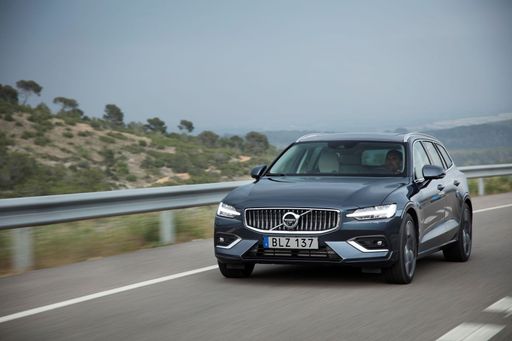 @ Volvo Cars
@ Volvo Cars
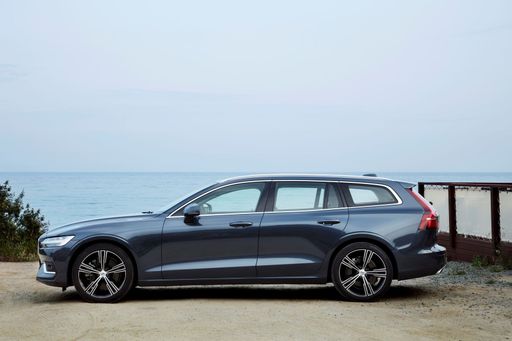 @ Volvo Cars
@ Volvo Cars
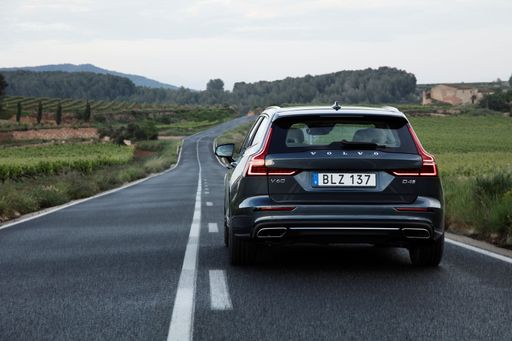 @ Volvo Cars
@ Volvo Cars
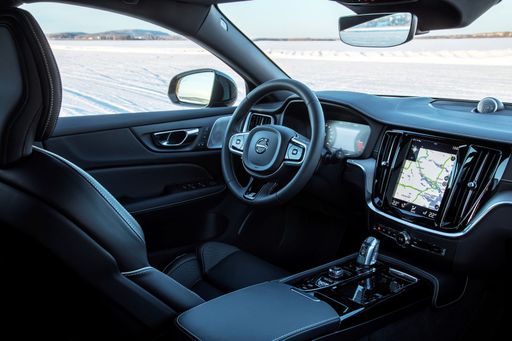 @ Volvo Cars
@ Volvo Cars
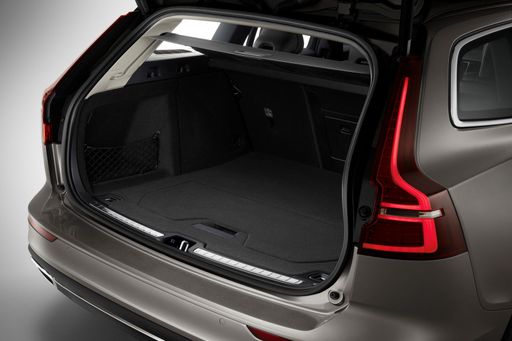 @ Volvo Cars
@ Volvo Cars
VW Tiguan
The VW Tiguan blends sensible family practicality with a dash of German polish, delivering a calm, reassuring ride and a cabin that never feels like an afterthought. For buyers who want an SUV that’s easy to live with yet still nicely dressed, the Tiguan is the grown‑up choice that keeps a cheeky wink in reserve.
details @ Volkswagen AG / VW Media
@ Volkswagen AG / VW Media
 @ Volkswagen AG / VW Media
@ Volkswagen AG / VW Media
 @ Volkswagen AG / VW Media
@ Volkswagen AG / VW Media
 @ Volkswagen AG / VW Media
@ Volkswagen AG / VW Media
 @ Volkswagen AG / VW Media
@ Volkswagen AG / VW Media
 @ Volkswagen AG / VW Media
@ Volkswagen AG / VW Media
 @ Volvo Cars
@ Volvo Cars
|
 @ Volkswagen AG / VW Media
@ Volkswagen AG / VW Media
|
|
|
|
Costs and Consumption |
|
|---|---|
|
Price
41600 - 64200 £
|
Price
32800 - 51900 £
|
|
Consumption L/100km
2.4 - 6.2 L
|
Consumption L/100km
1.4 - 8.4 L
|
|
Consumption kWh/100km
-
|
Consumption kWh/100km
-
|
|
Electric Range
92 km
|
Electric Range
118 - 126 km
|
|
Battery Capacity
14.70 kWh
|
Battery Capacity
19.70 kWh
|
|
co2
54 - 140 g/km
|
co2
32 - 190 g/km
|
|
Fuel tank capacity
60 L
|
Fuel tank capacity
45 - 58 L
|
Dimensions and Body |
|
|---|---|
|
Body Type
Estate
|
Body Type
SUV
|
|
Seats
5
|
Seats
5
|
|
Doors
5
|
Doors
5
|
|
Curb weight
1734 - 2064 kg
|
Curb weight
1599 - 1890 kg
|
|
Trunk capacity
519 L
|
Trunk capacity
490 - 652 L
|
|
Length
4778 mm
|
Length
4539 mm
|
|
Width
1850 mm
|
Width
1842 - 1859 mm
|
|
Height
1432 mm
|
Height
1656 - 1658 mm
|
|
Max trunk capacity
1431 L
|
Max trunk capacity
1486 - 1650 L
|
|
Payload
466 - 506 kg
|
Payload
460 - 533 kg
|
Engine and Performance |
|
|---|---|
|
Engine Type
Petrol MHEV, Plugin Hybrid
|
Engine Type
Petrol, Petrol MHEV, Diesel, Plugin Hybrid
|
|
Transmission
Automatic
|
Transmission
Automatic
|
|
Transmission Detail
Dual-Clutch Automatic, Automatic Gearbox
|
Transmission Detail
Dual-Clutch Automatic
|
|
Drive Type
Front-Wheel Drive, All-Wheel Drive
|
Drive Type
All-Wheel Drive, Front-Wheel Drive
|
|
Power HP
197 - 455 HP
|
Power HP
130 - 272 HP
|
|
Acceleration 0-100km/h
4.6 - 7.6 s
|
Acceleration 0-100km/h
5.9 - 10.6 s
|
|
Max Speed
180 km/h
|
Max Speed
198 - 242 km/h
|
|
Torque
300 - 709 Nm
|
Torque
220 - 400 Nm
|
|
Number of Cylinders
4
|
Number of Cylinders
4
|
|
Power kW
145 - 335 kW
|
Power kW
96 - 200 kW
|
|
Engine capacity
1969 cm3
|
Engine capacity
1498 - 1984 cm3
|
General |
|
|---|---|
|
Model Year
2024 - 2025
|
Model Year
2024 - 2025
|
|
CO2 Efficiency Class
E, B
|
CO2 Efficiency Class
G, D, E, F, B
|
|
Brand
Volvo
|
Brand
VW
|
What drive types are available for the Volvo V60?
The Volvo V60 is available as Front-Wheel Drive or All-Wheel Drive.
The prices and data displayed are estimates based on German list prices and may vary by country. This information is not legally binding.
